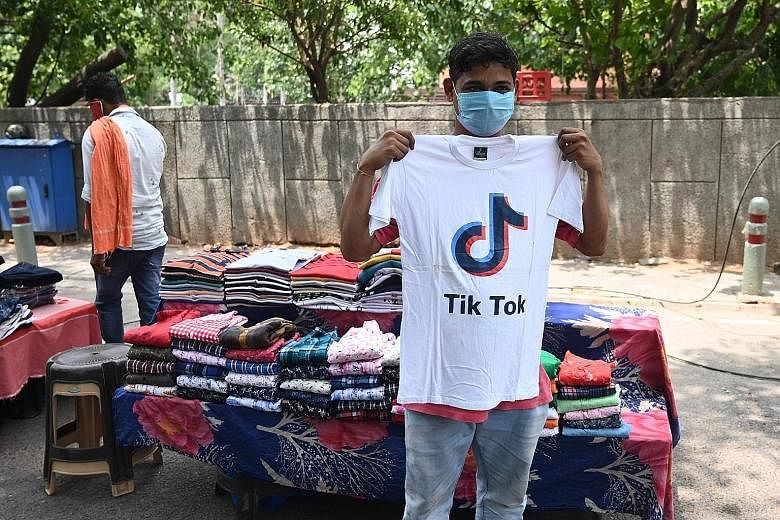Somewhere in India, a shepherd is seen walking ahead of his multi-coloured sheep and looking at his smartphone, lip-syncing lines from a popular Bollywood song starring his favourite actor Salman Khan: "I'm taking them with me, with me to my neighbourhood."
And then he throws his head back and laughs.
The video clip of the unknown Indian shepherd with a Bollywood obsession went viral on TikTok last year. In many ways, the Chinese app represents the diversity of Indian Internet users better than many other social media platforms.
On Monday, TikTok became one of 59 Chinese mobile apps banned by the Indian government. The move could affect how millions of Indians work and play.
India's Ministry of Electronics and Information Technology said that the 59 apps - which include Alibaba's UC Browser, Tencent's WeChat and two Xiaomi apps - were "stealing and surreptitiously transmitting users' data" outside India, which "requires emergency measures" to "safeguard the interests" of Indian mobile and Internet users.
The ministry did not specifically refer to China, but the ban comes amid growing tensions along a disputed border between the countries. At least 20 Indian soldiers were killed in clashes with Chinese troops in the Himalayan region.
Responding to the ban, Chinese Foreign Ministry spokesman Zhao Lijian told reporters in Beijing that "China is strongly concerned" about the Indian notice.
Stressing that the Chinese government has always asked its businesses to abide by international and local laws, he added: "The Indian government has a responsibility to uphold the legitimate and legal rights of the international investors, including Chinese ones."
Of the apps India has banned, ByteDance-owned TikTok is the most popular, with about 200 million active users in the country.
About 30 per cent of the app's global downloads are from India, which is its largest foreign market.
The company employs about 2,000 people in the country.
In a statement, TikTok said that it complies with all Indian laws and does not share user information with any foreign government.
It added: "We have been invited to meet the concerned government stakeholders for an opportunity to respond and submit clarifications."
Many TikTok users in India are first-time Internet users from the smaller towns. Budding entrepreneurs and artists also use the app to grow their businesses.
Mr Tariq Khan, a 21-year-old photographer from Mumbai, has almost 8.5 million followers on TikTok and earns about 100,000 rupees (S$1,850) a month from brand endorsements and celebrity collaborations.
"I have not experienced any illegality or privacy issues, but if TikTok is banned, I won't use it. Maybe it's a temporary move," said Mr Khan.
Privacy activists said the ban was less about privacy and more about sending a message to China.
Internet Freedom Foundation's Apar Gupta said the blanket ban violates technology laws that require the government to provide reasons for each individual blocking order.
"Are we actually eroding our own democratic values to respond to an aggressive neighbour?" he asked.
The border clashes and the coronavirus pandemic have led to growing demands in India to boycott Chinese products.
In April, the Indian government issued an order that makes Chinese investment - which has doubled from 2018 to last year - subject to approval from the Home Ministry.
At least 18 of 30 start-up unicorns in India have Chinese capital.
Alibaba's investments include mobile payments company Paytm, food delivery app Zomato, online grocer BigBasket and e-commerce platform Snapdeal.
Tencent invests in food delivery app Swiggy, e-commerce platform Flipkart, ride-sharing firm Ola and learning app Byju's.
"Emerging start-ups may see the small Chinese funds investing from US$1 million to US$5 million (S$1.4 million to S$7 million) disappear. But the big Chinese investors will find a way to indirectly invest in a growing market like India," said Mr Deepak Abbot, a fintech entrepreneur and former senior vice-president of Paytm.
Some Indian apps like ShareChat, a local language social media platform, welcomed the ban. "We're a company made by Indians, in India & for Indians!" the company posted on its Twitter account yesterday.
Chingari, another alternative to TikTok, has been downloaded 2.5 million times since the ban.
The Indian apps have yet to build a large user base, but Mr Khan said: "Platforms don't matter, the creator does. Those who want to express themselves will find a way."

